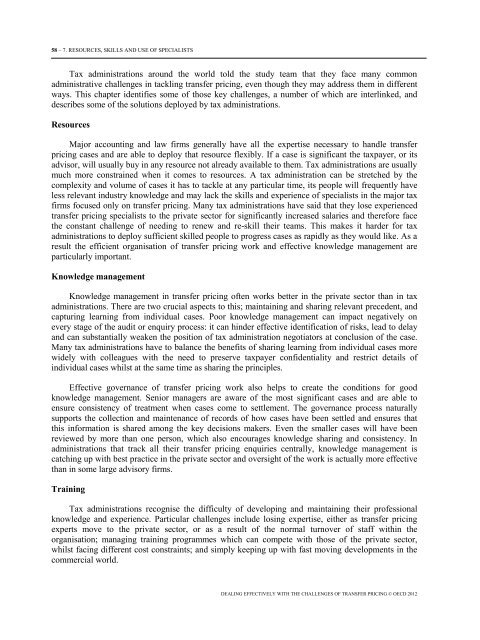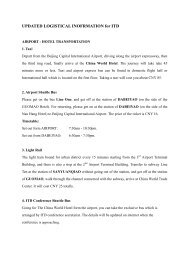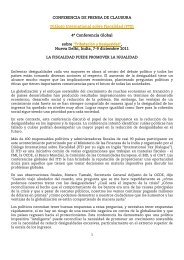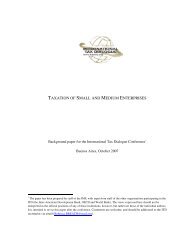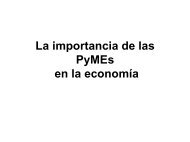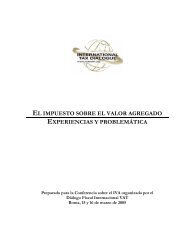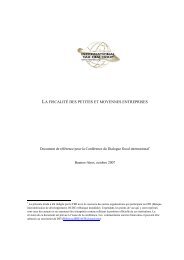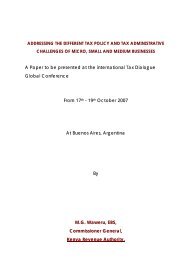Arcotia Hatsidimitris - International Tax Dialogue
Arcotia Hatsidimitris - International Tax Dialogue
Arcotia Hatsidimitris - International Tax Dialogue
You also want an ePaper? Increase the reach of your titles
YUMPU automatically turns print PDFs into web optimized ePapers that Google loves.
58 – 7. RESOURCES, SKILLS AND USE OF SPECIALISTS<br />
<strong>Tax</strong> administrations around the world told the study team that they face many common<br />
administrative challenges in tackling transfer pricing, even though they may address them in different<br />
ways. This chapter identifies some of those key challenges, a number of which are interlinked, and<br />
describes some of the solutions deployed by tax administrations.<br />
Resources<br />
Major accounting and law firms generally have all the expertise necessary to handle transfer<br />
pricing cases and are able to deploy that resource flexibly. If a case is significant the taxpayer, or its<br />
advisor, will usually buy in any resource not already available to them. <strong>Tax</strong> administrations are usually<br />
much more constrained when it comes to resources. A tax administration can be stretched by the<br />
complexity and volume of cases it has to tackle at any particular time, its people will frequently have<br />
less relevant industry knowledge and may lack the skills and experience of specialists in the major tax<br />
firms focused only on transfer pricing. Many tax administrations have said that they lose experienced<br />
transfer pricing specialists to the private sector for significantly increased salaries and therefore face<br />
the constant challenge of needing to renew and re-skill their teams. This makes it harder for tax<br />
administrations to deploy sufficient skilled people to progress cases as rapidly as they would like. As a<br />
result the efficient organisation of transfer pricing work and effective knowledge management are<br />
particularly important.<br />
Knowledge management<br />
Knowledge management in transfer pricing often works better in the private sector than in tax<br />
administrations. There are two crucial aspects to this; maintaining and sharing relevant precedent, and<br />
capturing learning from individual cases. Poor knowledge management can impact negatively on<br />
every stage of the audit or enquiry process: it can hinder effective identification of risks, lead to delay<br />
and can substantially weaken the position of tax administration negotiators at conclusion of the case.<br />
Many tax administrations have to balance the benefits of sharing learning from individual cases more<br />
widely with colleagues with the need to preserve taxpayer confidentiality and restrict details of<br />
individual cases whilst at the same time as sharing the principles.<br />
Effective governance of transfer pricing work also helps to create the conditions for good<br />
knowledge management. Senior managers are aware of the most significant cases and are able to<br />
ensure consistency of treatment when cases come to settlement. The governance process naturally<br />
supports the collection and maintenance of records of how cases have been settled and ensures that<br />
this information is shared among the key decisions makers. Even the smaller cases will have been<br />
reviewed by more than one person, which also encourages knowledge sharing and consistency. In<br />
administrations that track all their transfer pricing enquiries centrally, knowledge management is<br />
catching up with best practice in the private sector and oversight of the work is actually more effective<br />
than in some large advisory firms.<br />
Training<br />
<strong>Tax</strong> administrations recognise the difficulty of developing and maintaining their professional<br />
knowledge and experience. Particular challenges include losing expertise, either as transfer pricing<br />
experts move to the private sector, or as a result of the normal turnover of staff within the<br />
organisation; managing training programmes which can compete with those of the private sector,<br />
whilst facing different cost constraints; and simply keeping up with fast moving developments in the<br />
commercial world.<br />
DEALING EFFECTIVELY WITH THE CHALLENGES OF TRANSFER PRICING © OECD 2012


